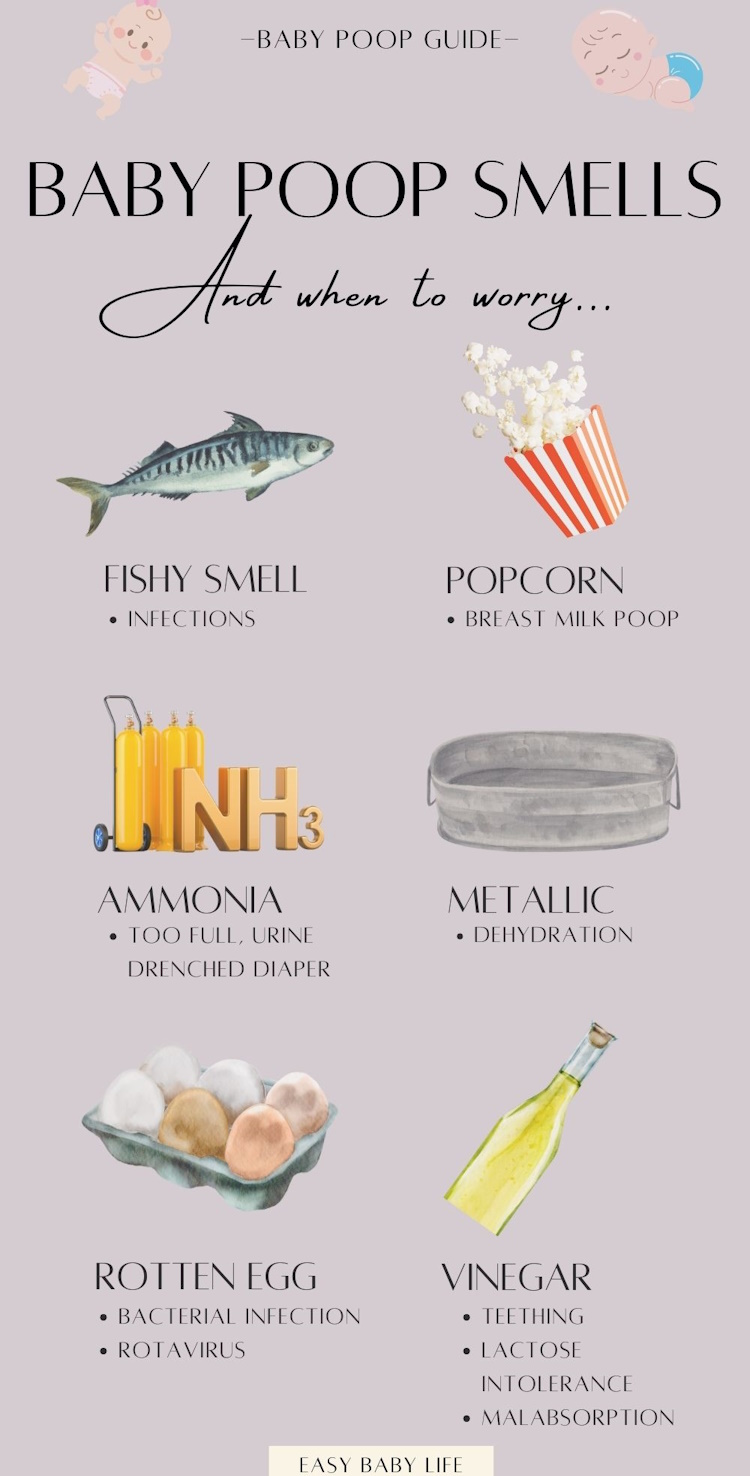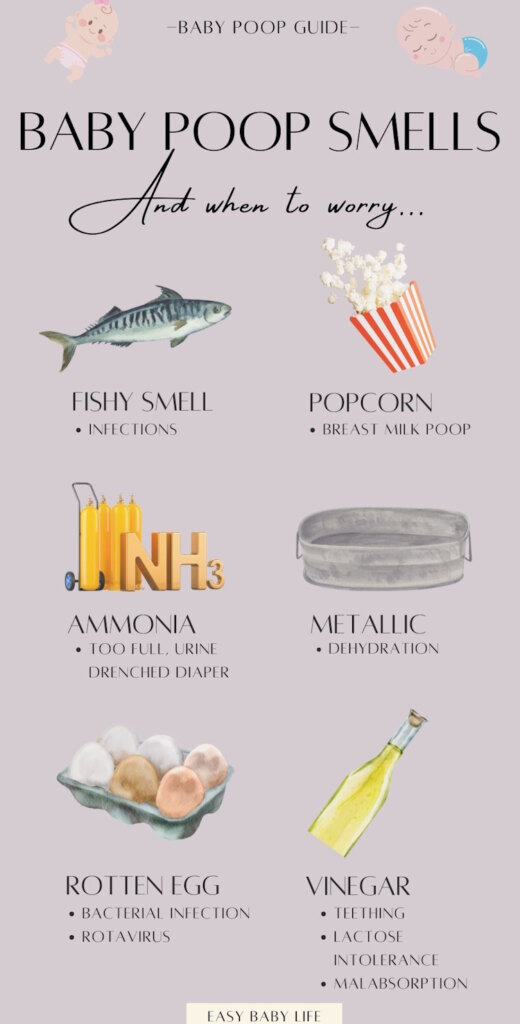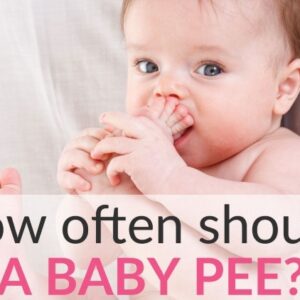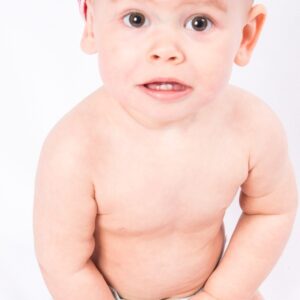Does your baby’s poop smell bad? There can be several different explanations for this, including changes in your baby’s diet, allergies, infections, and teething. What your baby eats (breastfed, formula-fed, and/or solid foods), together with the actual smell (e.g., fishy, sour, vinegar, sweet) and any signs of illness, will reveal the reason for the smelly poops.
Let’s go through some important reasons for foul-smelling stool in babies and what to do about it.
Mom’s Question:
What are the reasons for smelly bowel movements in babies? My baby’s poop smells bad, actually really bad!
My daughter is 7.5 months old, she is on Similac formula, Nestle rice cereal, and Heinz baby food, and her stool is green and mucousy, and it smells terrible. I have never known a baby (which I have been around a lot of) to have this strong smell to their stool.
I was just wondering if this is something that causes concern or if it is a side effect of either her food formula or teething.
Vanessa (B.C. Canada)
Reasons For Smelly Poop in Babies
In this article…
The Normal Baby Poop Smell Depending on Diet
To be able to determine if your baby’s poop smell is a cause of concern, it helps to know what smell to expect depending on what your baby eats.
Breastfed Babies’ Poop
Breastfed babies usually have mushy and soft or even runny stools. The color ranges from mustard yellow to moss green poop.
Usually, a breastfed baby’s stool does not smell much at all. It can have a mild, sweet smell or a smell that reminds of popcorn. This is because the breastmilk particles are so tiny that they are mostly absorbed in the gut. The ones that the babies pass out are essentially what is left of the digested milk. It does not stay long in the gut (that is why breastfed babies poop as frequently as they feed); hence they do not accumulate bacteria, decreasing the chances for it to smell.
Formula-fed Babies
Formula-fed babies’ stools tend to be more solid, similar to peanut butter and have a stronger smell than the poop of breastfed babies. Since formulas are based on cow’s milk, soy protein, or possibly some other proteins that are not as easily digestible, they take longer to process than breastmilk particles, sit in the gut bacteria longer, and therefore have a stronger smell. This is also the reason why formula poop is more solid.
A study from 2001 (referenced below) confirmed that the stools of formula-fed babies contained much more odor-causing sulfur gases than breast milk poop.
Babies That Eat Solid Foods
For babies on a supplemental diet (started on solids), the poop will definitely smell more like “regular” human poop. The smell will still depend on the baby’s diet. Food such as ginger, onions, garlic, vegetables, meat, and fruits contribute to the smell of the poop.
Reasons For Very Smelly Bowel Movements in Babies
So, poop naturally smells, and more so, the more solid foods your baby eats. However, there are occasions when the smell can be really bad, and this can be a sign of a health problem. If, for example, there is a sudden change in the smell or the bad smell is combined with signs of illness, these are good reasons to look for possible explanations for the situation.
Here are some common reasons for smelly baby stools.
1. Baby’s diet
As previously mentioned, babies who eat solid food will have more odorous poop than those breastfeeding or formula-feeding. Whatever they eat will contribute to the smell and consistency of their poop.
Introducing new foods to your baby can lead to sudden changes in the poop smell. If you just introduced foods like meat, poultry, or broccoli to your child, it is possible that their poop starts smelling like rotten eggs. This is because these foods are rich in sulfates.
2. Lactose intolerance
Lactose intolerance can also lead to foul-smelling stools. However, it is important to note that lactose intolerance is caused by a lack of the enzyme lactase, which breaks down lactose into simpler forms of sugar to absorb in the gut properly. If this enzyme is lacking, lactose can travel undigested through your baby’s digestive system and lead to foul-smelling stools.
Lactose intolerance is different from milk allergy. Milk allergy is an allergy to cow’s milk. It is basically caused by the immune system reacting when cow’s milk is consumed. Other milk sources, such as those from sheep or goats, can also cause an allergic reaction.
Lactose intolerance can cause bloating, gas, abdominal pain, and diarrhea. Your doctor will ask for your baby’s eating habits and other pertinent medical and family history to diagnose this. A series of tests for lactose intolerance will also be conducted to confirm the diagnosis.
As for milk allergy, the symptoms include wheezing, itching or rashes, vomiting, and swelling of the eyes or lips. But do note that this can also cause abdominal symptoms such as abdominal cramps and diarrhea. Anaphylaxis or severe allergic reactions can occur with milk allergy. If this happens, bring your baby to the emergency room immediately.
There are alternatives for lactose intolerant babies, such as low lactose formulas or lactose-free formula milk. As for milk allergy, breastmilk is still the best alternative for cow’s milk. Another alternative is hypoallergenic milk (i.e., casein or whey) or soy-based formula. (It should be noted that children under the age of 12 months should not drink cow’s milk at all since the milk can lead to bleeding in the intestines, manifested with bloody poop.)
You can read more about lactose intolerance and milk protein allergy here.
3. Celiac Disease
Babies can develop celiac disease or gluten intolerance once they have been introduced to gluten. Since celiac disease tends to run in families, it is important to note any symptoms early and talk to your baby’s pediatrician if needed. According to the Celiac Disease Foundation, some signs of celiac disease in babies and toddlers are:
- Vomiting
- Bloating
- Irritability
- Poor growth
- Abdominal distension
- Diarrhea with very foul stools
- Malnutrition
Intestinal Infections
Infections in the gut may cause foul-smelling poop. Some may even give off a distinct odor. These include parasitic, viral, or bacterial infections:
4. Giardiasis
Giardiasis is a parasitic infection that can be passed or transmitted from an infected person through the fecal-oral route (anything that comes into contact with the hand and is put into the mouth). Poor hygiene and sanitation can be a source and breeding place for giardia parasites. Symptoms include diarrhea and foul-smelling poop that is greasy and usually floats in water.
5. Cholera
Cholera is an acute diarrheal bacterial infection caused by the bacteria Vibrio Cholerae. This is usually contracted when a person ingests contaminated water or food. Symptoms include watery diarrhea, severe dehydration, and a distinct foul-smelling poop (fishy smell).
6. Salmonella
Salmonella is another diarrheal disease that comes from food contaminated with infected animal feces. Food that is not cooked properly is usually the common culprit. These include eggs, chicken (poultry), beef, fruits, and vegetables. Salmonella infection produces loose stools and foul-smelling poop.
7. Escherichia coli infections
Escherichia coli infections can cause urinary tract infections, bacteremia, or sepsis in infants. Symptoms include fever, vomiting, diarrhea, and poor feeding. Watery diarrhea is a common feature, sometimes becoming blood-streaked. There is no specific poop smell for E. coli infections.
8. Rotavirus
Rotavirus causes a strong poop smell, possibly including a slight smell of rotten eggs. Other symptoms include watery stools, fever, nausea, and abdominal cramps. This is common in infants and can sometimes cause severe disease. This can be found in contaminated common surface areas such as toys, changing tables, and door knobs. Ingestion of contaminated food and water is also a common source of rotavirus.
However, this can be prevented early on in infancy. A 2-dose rotavirus vaccine is often given to babies less than six months of age.
9. Lactose overload
Lactose overload occurs in healthy babies, mostly with an oversupply of breast milk. This, in turn, causes greenish poop with an acidic, sour smell. The baby is often flatulent or passes out gas more frequently. This is due to an insufficiency of the lactase enzyme, which breaks lactose into more absorbable particles. This may cause irritation of the anal area due to frequent watery diarrhea, giving you an irritable baby. Usually, an adjustment in feeding can resolve this.
10. Teething
This does not happen to all babies, but some babies tend to experience soft, loose poop and poop smelling like vinegar when they are teething. No concrete evidence establishes the connection between teething and the poop smell; however, many parents agree that their babies’ stools suddenly smelled like vinegar just before one of their baby’s teeth erupted.
 Pin
Pin
Different smells and what they might indicate
1. My baby’s poop smells like vinegar
This usually indicates malabsorption, lactose intolerance, teething, or indigestion. Malabsorption or lactose intolerance usually produces sour-smelling poop.
2. My baby’s poop smells like popcorn
Breastfed babies usually produce sweet-smelling poop, like buttered popcorn.
3. My baby’s poop smells like rotten eggs
This may indicate the duration of poop sitting in bacteria in the baby’s gut. The longer the poop stays in the large intestine, the longer the bacteria accumulate, causing a rotten egg smell to their poop.
Rotavirus is also known for its characteristic poop smell of rotten eggs.
4. My baby’s poop smells like fish
Foul-smelling poop can indicate an infection such as cholera. As mentioned earlier, Cholera can cause other symptoms such as acute watery diarrhea and severe dehydration. Your doctor will ask for your baby’s medical history, travel, and family history to diagnose this.
Other infections, as mentioned above, can also make the baby’s poop smell like fish.
5. My baby’s poop smells like ammonia
When a baby’s poop smells like ammonia, it is most likely caused by a drenched, unchanged diaper full of poop and urine. Urine has ammonia and can cause a distinct smell when mixed with poop.
6. My baby’s poop smells like metal
A dehydrated baby may pass out a faint metallic-smelling poop. Dehydrated babies are usually lethargic or drowsy, with limp limbs. They may have sunken eyeballs and fontanels and poor skin turgor. This warrants a trip to the emergency room when this happens.
When Should I Worry about the Baby’s Poop Smell?
A baby’s poop will undergo many changes as to its consistency, color, and smell. This is a reflection of the baby’s diet as he grows.
A sudden shift in the smell, a change in consistency (formed to watery), and frequency (more than the usual frequency of pooping), accompanied by other symptoms such as fever, irritability, change in feeding, and level of consciousness, are indicators of illness. Make sure to consult your baby’s healthcare provider as soon as possible.
Moreover, babies have a sensitive gut, so good hygiene practices are necessary to eliminate any sources of infections. Always wash hands and clean common surface areas at home that your baby may frequently come in contact with. Be conscious and cautious about how to introduce new food and feeding techniques.
More Baby Poop Issues
- Signs Of Teething In Babies
- Symptoms Of Infant Diarrhea
- Fussy Baby With Smelly Stools
- Breastfed Baby Poop Watery and Runny: 4 Important Reasons
References
- Pediatric Malabsorption Syndromes Clinical Presentation
- Diagnosis of rotavirus gastroenteritis by smell
- Lactose Intolerance
- Salmonellosis
- Parasites – Giardia
- Gas production by feces of infants
What’s your experience of smelly poop in babies? Join the discussion! :-)
The information in this article is provided by Medical Doctor Janina Kong to provide examples and knowledge to help parents dig deeper into their baby’s situation, not to offer a complete picture or a possible diagnosis.

Paula Dennholt founded Easy Baby Life in 2006 and has been a passionate parenting and pregnancy writer since then. Her parenting approach and writing are based on studies in cognitive-behavioral models and therapy for children and her experience as a mother and stepmother. Life as a parent has convinced her of how crucial it is to put relationships before rules. She strongly believes in positive parenting and a science-based approach.
Paula cooperates with a team of pediatricians who assist in reviewing and writing articles.











I have learnt new things a bout my baby
My baby is 1 year and 10 months old… This is the first time that her poop smells like that…
It’s really stinky and even I already washed her 4 times I can still smell it… She had normal poop smell as her diet and she’s breastfeeding . I am so worried and it makes me nervous because her poop smells like rotten egg and rotten fish at the same time… First time in her 1 year and 10 months
My 9-month-old son has really smelly poop and I’m wondering if I should be worried. His poop is the normal everyday color from the baby food I give him, yes he is teething and yes he is on Similac sensitive formula. So what should I do
I have been going through the exact same thing with my 9-month-old son, for almost 2 weeks. The only new foods I’ve given him are Yogurt Melts and Cheerios. He has eaten my yogurt and baby cereal before with no problem, so I thought it shouldn’t be the new foods. He IS teething and they are hurting him… I hope it is the teething. How interesting.
You are giving a 9-month baby Cheerios. Why? They contain a lot of sugar.
If the stool is green, take the baby to the doctor. Rotavirus is associated with green stool and a strong smell.
What’s the big deal with cheerios?? I have been giving them to my little girl since she was 6 months and her pediatrician suggested it!
Thanks for the tip on rotavirus, though, I’ll have to check that up!
It could also be an allergic reaction. We had a similar problem with my 10-month old after I gave her wheat cereal! Try eliminating it for a few days and bring it back to experiment. They smell more with solids too!
More than likely it the teething. My daughter experienced the same type of smelly diapers. It almost smells acidic. It will eventually go away just bare with it when those pearly whites pop threw it will be worth it believe it or not.
Yes that’s what it smells like acidic kinda i cant wait for the those teeth to come in and the smell. Thank You
My 2 1/2 year old has green poop with a jelly slimy green jelly ooze that’s mixed in as well as all over its been this way last 3 days. And yesterday she pooped 4 times. I’m woundering what this is. I’m planning on taking her to doctor tm. I saved the pull up and wrapped it up so they can test it. But I’ve never ever seen this. Please if you have seen or experienced this let me know
Hi Angel,
Did you sort this out? Green poop can sometimes be related to viruses, like a cold. It is usually not dangerous, but of course should be sorted out.